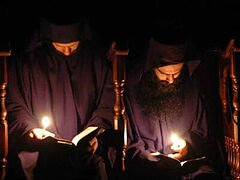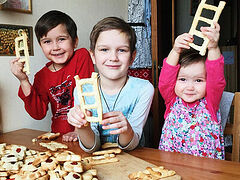Great Lent is a special period of repentance and restraint. A lot of families are faced with the dilemma: should their children fast, and is it good for them? How can we find a correct child-friendly measure for the Lenten fasting experience? Add to this all sorts of common fears and opinions about children’s fasting. We asked Archpriest Maxim Pervozvansky, the head of a large family and a grandfather, to voice his opinion about this question.
 At breakfast. Painter: Zinaida Serebriakova
At breakfast. Painter: Zinaida Serebriakova
—Lent is the time for us to repent and lament about our sins. What sins are we talking about with regards to, say, elementary school children?
—The meaning of fasting for children is slightly different, as they are probably unable to lament about their sins during all those forty-plus days. For them, it is simply a habit of asceticism they will certainly benefit from once they grow up.
While they attend church on the first week of Great Lent during the reading of the Great Penitential Canon of St. Andrew of Crete, the Liturgy of Pre-Sanctified Gifts, or the services of the Holy and Great Passion Week, we for example take our children with us beginning from kindergarten age—it tunes the child’s soul to a certain mood. Besides, staying away from certain games and entertainment, or food limitations, creates a special fasting environment. It is desirable to include in the child’s daily prayer rule either the prayer of St. Ephraim the Syrian or the singing of the penitential troparions: “Have mercy on us, O Lord, have mercy on us”.
A young child can’t be focused on repentance all the time
Even an ordinary adult is unable to continuously remain in a state of repentance without special spiritual experience, never mind a young child. That’s why we shouldn’t expect from him to do more than he can at the moment. At the same time, a child who is accustomed to limiting his desires in food and entertainment for a long time will handle with ease the fasting rules required of an adult.
I know some families where the parents pitied their children till they were teenagers, protecting them from fasting. Unfortunately, they realized that once their children grew up, they couldn’t keep to fasting as required. They didn’t develop a fasting habit and renounced fasting altogether. For those children who follow their parents and fast from the cradle, it becomes a norm of life.
—Lent is the time of particular fasting from food. It is harmful to a growing young child and may cause illness.
—There is the following fasting pre-requisite all of us should follow: fasting shouldn’t negatively affect our health. Therefore, if a child or an adult is seriously ill, then that is surely a reason for easing the fasting rules. For healthy children there is a general fasting rule—they can consume fish during Lent; as for sick and weak children, they are allowed to have milk.
There is the following fasting pre-requisite to anyone who fasts: fasting shouldn’t negatively affect our health
Overall, fasting can’t harm anyone, be it a pregnant woman, a nursing mom, or a young child. We have so many options on the table, such as fish and vegetables, and even these contain all the necessary minerals and vitamins. All we have to do is to watch out for our children’s general well-being as well as for our own, because Lent was made for man, not man for Lent. If a nursing mother decides to take up fasting and her milk supply suddenly decreased, she should definitely stop fasting altogether. But to tell you the truth, usually it doesn’t disappear—or at least I never heard of that happening to a healthy woman.
If someone (a young child or an adult) begins fasting for the first time, they can start it slowly. I know someone who was recently baptized and he asked if he could abstain from eating meat during only the first week of Lent. I replied, “You decide; I can’t make you do it otherwise.” Then he asked if he can continue fasting from meat during the second week, and then, by with the third, he was already fasting according to the general rule.
On the whole, jump-starting the life of an ascetic with fasting, prayer, etc., or overextending oneself, may lead not only to loss of health but also to dangerous disappointment in the spiritual life. This applies to children and young adults, as well. I have a few friends who in the 1990s left for the monasteries during Great Lent, stayed in the attic and ate nothing but five prosphora a day. Two years of fasting like that and they simply left the Church. They exerted great efforts and their health took a hard hit, but the spiritual effect was hardly in evidence.
We must keep everything in moderation and keep in mind that fasting isn’t a once-in-a-lifetime affair for a Christian; we are in it for life, until death. That’s why the level of fasting should be well balanced and easy enough for us to handle. As for the existing fasting rule, it is quite manageable for a child and an adult to handle.
—Children who keep fasts are forced to be different from their peers and may become outcasts or victims of bullying.
—My children attended—and some continue to this day—a regular school, not an Orthodox one, and they have never had to deal with anything like that. According to my observations, long gone is the era of universal equality when all of us should have looked or acted alike, when everyone should have worn bell-bottoms because it was fashionable and everyone had them, or maxis and minis, and everyone had them en masse.
We did have this problem during my childhood, and if you were even a little bit different from others you could become an outcast. As for now, the less you look like the rest, the more exciting it gets. That’s why if children don’t wall themselves off from others with their antics or peer- shaming, they will be fine. At least, I have never observed any negative attitude from either the children or the majority of teachers. You aren’t like all the others, that’s all—and it’s fine.
—If children keep the fast, there could be problems for parents from the state authorities. This is a particular concern for large families, who are already under some suspicion.
—It depends on the general public standing of the family. We have nine children. We were never an at-risk family. Quite the opposite, we often represent our local district and take part in various events sponsored by a local social welfare center. When the center’s director asked if she could visit us at home, she later kept telling everyone how well organized our family was. Sure, if the kids are dirty or live in filthy conditions, or if your family is generally suspected of any wrongdoing, and, on top of it, the authorities find out that you starve your kids —you will have to answer for that.
We regularly stage family performances on various topics, including Christian themes for veterans, and take part in locally organized festivities. We try not to live a sheltered life as we take it as an important missionary element of our life. I know many other large families who are also building a positive image for their families and never rouse the child protection services’ curiosity about their life.
—If a child is studying (at school or a university), he should have a considerably relaxed fasting rule.
—A commonly accepted practice is that they are allowed to have fish every day except for maybe Wednesday and Friday. My oldest daughters graduated from their school with distinction, entered the Moscow State University tuition free, and they strictly observed all the rules of fasting almost from the time they were born. My oldest daughter was the only absolutely healthy child in her class at school. That’s why the assumption that fasting stands in the way of health and the learning process is a myth.
—During Lent, children must involuntarily give up all kinds of entertainment: visiting friends, playing video games, etc.
—I don’t think so, and may the strict zealots of piety forgive me. At least, our family could never achieve that. We, so to speak, change the mood of the movies they are watching and limit the time they spend at playing video games. A child shouldn’t be stripped of things, but limited. The same goes for food, because we don’t deprive ourselves of food.
A child shouldn’t be stripped of things, but limited
Surely, it is certainly a good idea to completely abstain from games, movies, and entertainment during the first week of Lent and Passion Week. But I think it is fine to go the movies and watch something interesting at the end of the first week. We can replace the time spent in front of the computer or TV with family walks, but it doesn’t mean we have to walk around looking glum. It would be nice to go skiing or sledding. It is necessary for the kids and adults alike to remain in a good mood during Lent, so that we have enough energy left for prayer, work, and studies.
We should suggest to our kids to do more things together, as we are all so isolated from one another these days. We can recommend to do the family book readings and replace, say, “Treasure Island” with “Pollyanna.”
We can’t deprive our children of spiritual nourishment, as “a holy place is never empty” [nature abhors a vacuum], and we need to find a replacement to fill the void. So, to whatever extent the parents replace the freed space, so should it be limited. Moreover, the child has to accept the replacement, because if you start forcing him to listen to your reading exclusively from the life of the saints, he will have no other recourse but to fall asleep or complain: “Mom, when are you going to be done already?” And it will bring him absolutely no benefit spiritually.
—The children eat at a school canteen, and they offer nothing Lenten there. Lent will make them go hungry.
—They shouldn’t go hungry. If there is no opportunity whatsoever to eat Lenten foods, then those kids should observe the fasting rules applicable to travellers: no fasting—provided there is absolutely no possibility to keep it.
Still, I would recommend for such children to act in the following way: If you are served borsht with a piece of meat in it, eat everything but the meat. If you get pasta with sausages, limit yourself to the pasta only. This is already an indication that a child is making a conscious sacrifice.




